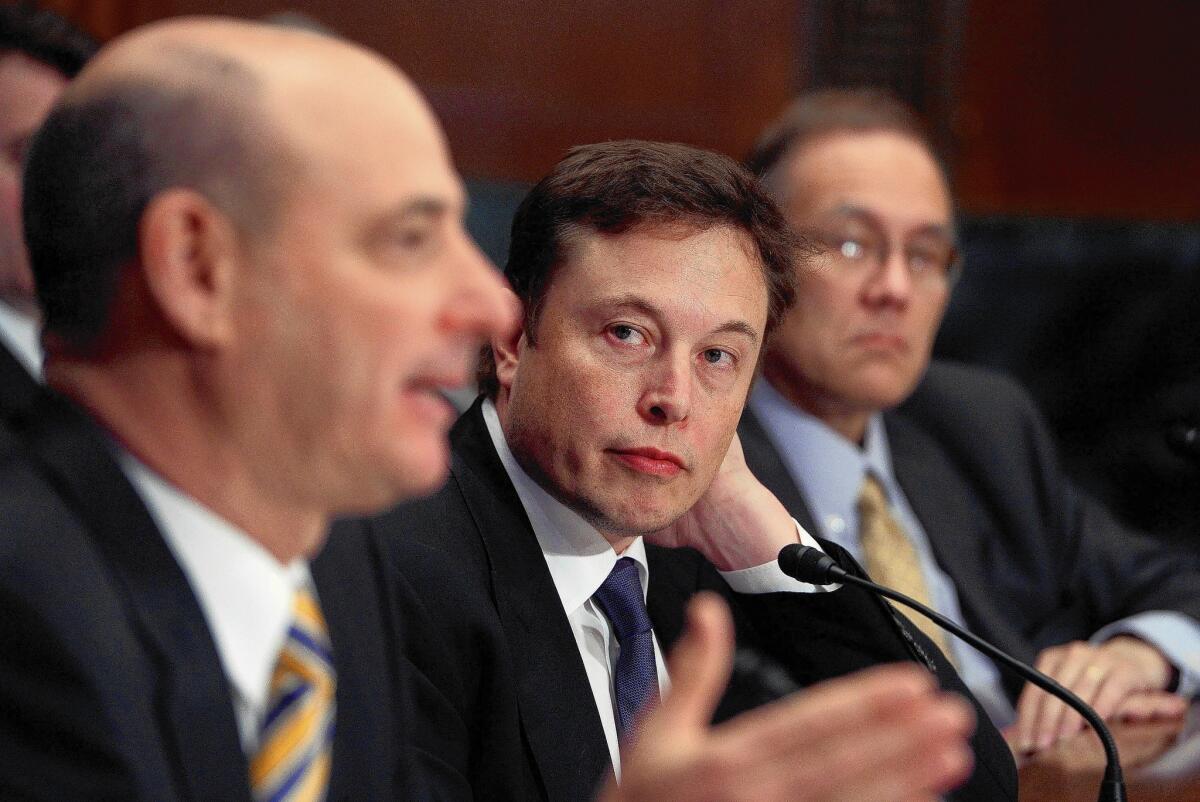Billionaire Musk makes push to launch military satellites

- Share via
Los Angeles billionaire Elon Musk, chief executive of Hawthorne rocket maker SpaceX, testified before Congress that the U.S. Air Force and other agencies are paying too high a price to launch its most valuable satellites into orbit.
The government pays billions to a sole provider to launch nearly all of its spy satellites and other high-profile spacecraft, without seeking competitive bids. That provider is United Launch Alliance, a joint venture of aerospace behemoths Lockheed Martin Corp. and Boeing Co.
The program will cost nearly $70 billion through 2030, according to the Government Accountability Office. And Musk wants a piece of those lucrative deals.
On Wednesday, he told the U.S. Senate Appropriations Subcommittee on Defense that the virtual monopoly has suppressed competition since 2006.
“Robust competition must begin this calendar year,” Musk said. “There should be no more sole-sourcing under this program when competition is an option,” said Musk, who is also the chief executive of Tesla Motors, the Palo Alto electric car company.
The Pentagon has already moved to introduce competition to the launch program, called the Evolved Expendable Launch Vehicle, or EELV.
In January, the Air Force announced a blockbuster deal to buy 36 of United Launch Alliance’s Atlas V and Delta IV rocket boosters. It also opened the door for new entrants to compete for 14 other missions from 2015 to 2017.
United Launch Alliance’s Chief Executive, Michael Gass, also appeared before the panel. Although his company welcomes competition, it might not result in savings, he said. After all, Boeing and Lockheed formed United Launch because market demand was insufficient to sustain two competitors.
“We went from two competing teams with redundant and underutilized infrastructure to one team that has delivered the expected savings of this consolidation,” he said, adding that all 68 of his company’s launches have been successful.
But a recent GAO report on the EELV program said that the formation of United Launch Alliance has made it difficult for the Defense Department to know exactly what it’s paying for.
“Minimal insight into contractor cost or pricing data meant [the Defense Department] may have lacked sufficient knowledge to negotiate fair and reasonable launch prices,” the report said. The report predicted program costs would grow an at “unsustainable rate.”
Musk argued that competition is inevitable and will ultimately save taxpayers billions of dollars.
“Competition is coming to the national security launch market, but it remains a question as to when and how,” he said. “SpaceX is ready now to compete, with our Falcon 9 [rocket].”
The company, officially known as Space Exploration Technologies Corp., has had eight launches with its Falcon 9 rocket.
It has carried out two cargo resupply missions to the International Space Station for NASA. It was the first private company ever to pull off the feat in 2012 after the U.S. space shuttle fleet was retired. SpaceX is now building a massive new rocket, called Falcon Heavy, capable of lifting the bulky satellites.
The rocket maker is not entirely reliant on the U.S. government. It has dozens of commercial contracts worth $5 billion to launch satellites aboard its rockets for various countries and telecommunications companies.
With about 3,500 employees, SpaceX is a fraction of the size of competitors such as Boeing and Lockheed, which employ hundreds of thousands of people across the U.S. and dozens of countries.
Some analysts see that as a strength. SpaceX doesn’t have layers of bureaucracy, and it manufactures nearly all of its own parts. But critics point out that the tight regulations on government contracts will add costs.
Founded in 2002, SpaceX makes cargo capsules and rockets at a sprawling facility in Hawthorne that was once used to assemble fuselage sections for Boeing 747s. Musk underscored this point to Congress.
“Our Falcon 9 and Falcon Heavy launch vehicles are truly made in America,” he said. “This stands in stark contrast to the United Launch Alliance’s most frequently flown vehicle, the Atlas V.”
That rocket uses a Russian engine, Musk said, and half the airframe is built abroad.
“Supply of the main engine depends on President Putin’s permission,” he said.
United Launch Alliance’s Gass quickly responded that the company had a two-year supply of the engines.
Still, there is no guarantee that SpaceX will win the Air Force’s EELV contracts. The company still must win government certification to launch military satellites with the Falcon 9. That requires three successful test launches that meet Air Force specifications, along with a host of audits and technical reviews.
More to Read
Inside the business of entertainment
The Wide Shot brings you news, analysis and insights on everything from streaming wars to production — and what it all means for the future.
You may occasionally receive promotional content from the Los Angeles Times.











